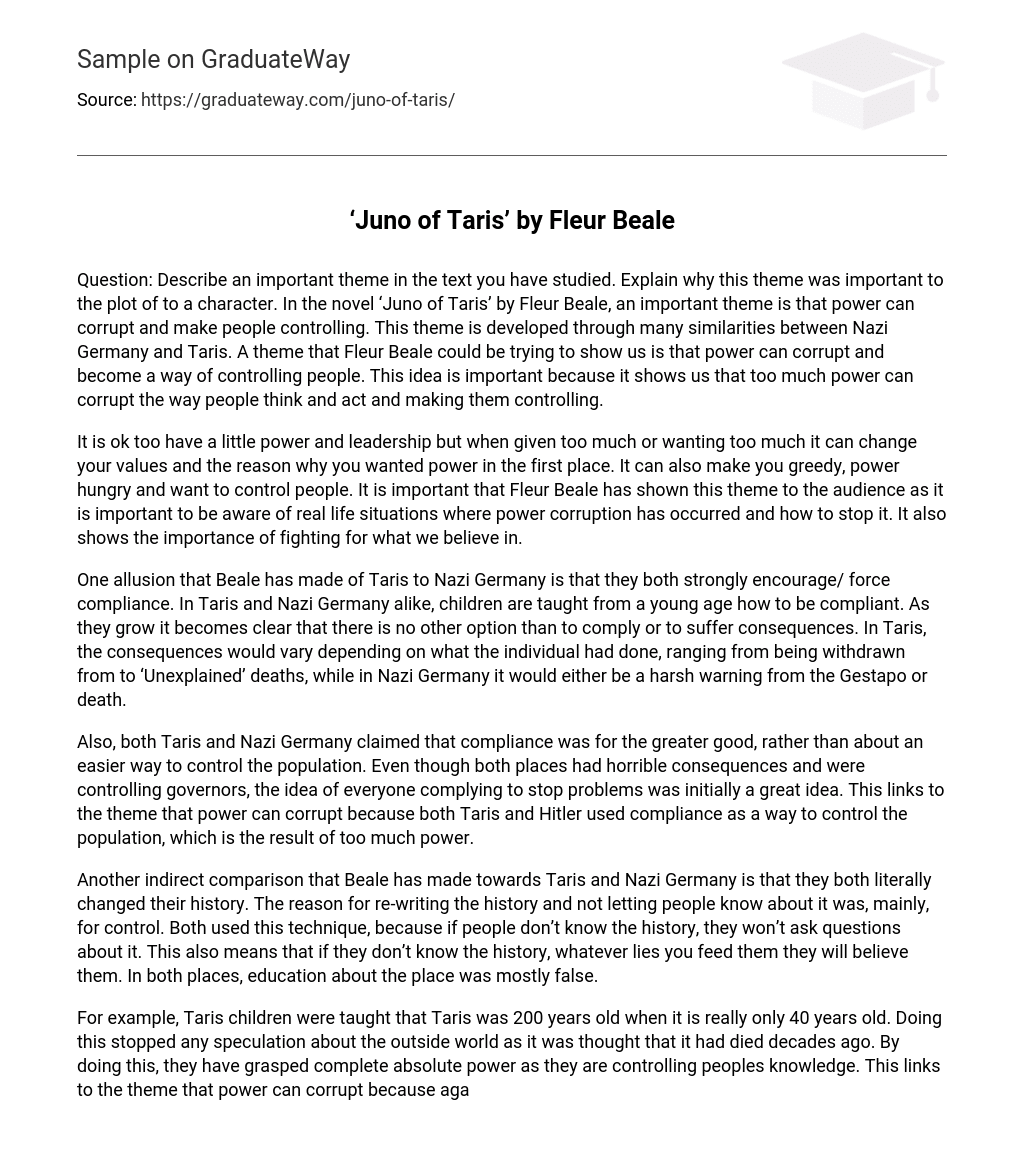Question: Discuss a significant theme in the text you have analyzed and demonstrate the significance of this theme to both the plot and a character’s development.
The novel ‘Juno of Taris’ by Fleur Beale highlights the theme that power has the potential to corrupt and exert control over individuals. This theme is exemplified through the striking similarities between Nazi Germany and Taris. Beale may be attempting to convey the message that the acquisition of power can lead to corruption, ultimately resulting in the manipulation and control of others. This notion holds significance as it reveals how an excess of power can corrupt one’s mindset and behavior, transforming them into authoritative figures.
Having some power and leadership is acceptable, but having an excessive amount or desiring too much can alter one’s values and the original purpose for seeking power. Moreover, it can instill greed, a hunger for power, and a desire to control others. Fleur Beale effectively presents this theme to the audience, highlighting the significance of being mindful of real-life scenarios involving power corruption and learning how to prevent it. Additionally, the text emphasizes the importance of advocating for our beliefs.
Beale has drawn a parallel between Taris and Nazi Germany in terms of their emphasis on compliance. Both societies actively promote and enforce obedience, starting from the early education of children. As individuals mature, it becomes evident that non-compliance is not tolerated, leaving them with only two choices: conform or face severe repercussions. In Taris, the consequences for defiance vary, ranging from isolation to unexplained fatalities, whereas in Nazi Germany, it could lead to stern warnings from the Gestapo or even death.
Both Taris and Nazi Germany asserted that compliance served the greater good, rather than being solely about exerting control over the population. Despite the grim outcomes and authoritarian regimes in both instances, the notion of universal compliance to prevent problems initially appeared laudable. This aligns with the theme that power can breed corruption, as both Taris and Hitler employed compliance as a tool for population control, a consequence of excessive power.
Beale indirectly compares Taris to Nazi Germany by pointing out that both societies manipulated their histories. The motive behind rewriting history was control; by withholding information, people would be less likely to question it. This enabled both regimes to easily spread falsehoods, as education in these places was largely misinformative.
For instance, the children of Taris were educated that Taris had a history of 200 years, despite its actual age being only 40 years. This tactic effectively eliminated any curiosity about the external world by creating the belief that it had perished several decades ago. Consequently, they have achieved utmost authority by manipulating the individuals’ understanding. This connects to the concept that power has the potential to corrupt, as Taris and Hitler have employed a similar strategy to dominate the population. Furthermore, both entities govern through instilling fear.
Initially, both parties had the greater good in mind, and then as they rapidly gained power to establish dominance, they turned into tyrants and dictators. Their methods included instilling fear in the population and imposing brutal punishments in order to maintain control. Their ultimate goal was to create a submissive society, eliminating anyone deemed undesirable. The reign of fear prevented people from challenging their authority. This demonstrates the significance of standing up for one’s beliefs; otherwise, we will live in constant fear and remain powerless and defenseless.
It suggests that power can make someone corrupt by demonstrating how easily the wrong person can be given power. It also underscores the importance of defending our convictions since our principles alone have no significance.
In summary, the novel Juno of Taris by Fleur Beale highlights the detrimental effects of power, which can lead to corruption and control. The allusions between Taris and Hitler’s Nazi Germany illustrate their shared traits of imposing compliance, altering history, and ruling through fear. This central theme emphasizes the significance of being cognizant of the dangers associated with excessive power.





